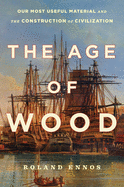
When thinking about stages of human progress and development of materials, phrases such as the Bronze Age and the Iron Age might come to mind, but in The Age of Wood, professor of biological sciences Roland Ennos (Trees) challenges readers to consider the importance of wood to the progress of human civilization.
Ennos writes: "This book is a new interpretation of our evolution, prehistory, and history," and he hopes to "show that looking at the world in this fresh wood-centered way... can help us make far more sense of who we are, where we have come from, and where we are going." He centers his approach as a biomechanic to look at how the unusual material properties of wood have had an underlying impact on other technologies, which have depended on the relative strengths of wood in mechanical production across history. He uses his own areas of expertise to consider primatology, engineering, architecture, archeology, history, carpentry, anthropology, geology and conservation studies, from prehistory to the present, and he engagingly argues that what society needs now is to reassess and reframe its relationship to this particular natural resource.
Ennos at times sidetracks into extended discussions of other materials, and extends an arguably Euro-centric lens to most of his interpretations of humanities and social science discussions. The blend of hard science and social sciences provides an accessible argument that wood as a material remains central to human development and to the continuation of human society today. -- Michelle Anya Anjirbag, freelance reviewer

